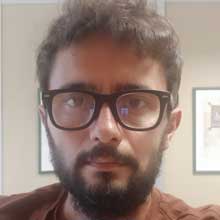Tell us about yourself: where do you come from, what do you teach at Ca' Foscari, what are your interests and areas of research?
My name is Maurizio Busacca. I have been working at Ca' Foscari University since 2020, teaching Economic Sociology and Sociology of Welfare. I am an economic sociologist, and I focus on the sociology of innovation and local areas. My main research interests are social innovation and local welfare, and I mainly study processes of pluralisation and collaborative governance. The policy areas that I am most dedicated to are active labour policies, youth policies, and work-life balance policies, which I consider to be emerging areas in a context of recalibration of the European welfare state within a social investment perspective. More recently, I have started working on collaborative spaces as places of social innovation and deep transformation of work in a society increasingly characterised by a new centrality of knowledge. From 2016 to 2019, I attended the Interdisciplinary PhD in 'Architecture, Cities and Design' at the IUAV University of Venice, where I obtained a specialisation in public policy. I have recently won a competition for a post as a Researcher on fixed-term contract (type A), and in 2020 I was awarded the National Scientific Qualification to become a professor in the second bracket for the competition sectors 14/D1 (Sociology of Economic Processes, Labour, Environment and Local Areas) and 14/C1 (General Sociology).
What are your professional reference points?
To list some of them would be to run the risk of leaving out someone else, which in itself is already very unfortunate; however, it would but even more unfortunate for me, because during my journey I have met many generous people, who have become points of reference not only on a disciplinary level (which is in itself fundamental), but above all on a human level, which is even more important for someone like me who thinks that society is a phenomenon of great interest and importance. Academia is often described as an individualistic environment, yet there are many opportunities for discussion and collaboration, and those who know how to seize and capitalise on them can embark on rewarding, generative paths, both in terms of research and teaching and in terms of interdisciplinarity. However, if it’s masters we are speaking about, then I would say Arnaldo Bagnasco and Ota De Leonardis.
What is a field that you have always wanted to deal with but have not yet had the opportunity to explore?
Undoubtedly schooling, especially childhood schooling. Educational poverty is a historical issue for economic sociology, which has mainly dealt with investigating the interconnections among social exclusion, economic poverty and educational poverty. However, it has dealt much less with the difference that the educational context can make, delegating it to other disciplines such as pedagogy or psychology. Recent events caused by Covid-19, such as school shutdowns, distance learning and social distancing have rekindled the interest of scholars, politicians and society at large in schools. However, this interest focused on the question of 'open schools or closed schools?'. I think it would have been important to discuss 'what kind of school?' instead. If I can, this will certainly be one of the next topics I will address.
What is the aspect you are most passionate about in your field of research?
Economic sociology is an applied science, which means not only that it has a strong relationship with its empirical referents, i.e., with the phenomena it observes and tries to explain, but also that it is very concerned with producing usable knowledge. I think that the usefulness and usability of the knowledge produced is one of the characteristics of economic sociology that made me fall in love with it. Consider, for example, the importance of Arnaldo Bagnasco's work in understanding the importance of forms of integration between the economy and society, thanks to which it was then possible to develop not only an intense strand of world-famous research such as that on industrial districts, but also a system of public policies dedicated to them; a more recent example is Carlo Trigilia's contribution to understanding local innovation systems, where again knowledge and policy action have run parallel.
What is your message to young people approaching research today?
To do it fearlessly, and above all without the hassle of academic classification, because if one is capable and dedicated, that will follow. Moreover, in today's society, where knowledge has become increasingly central to the economic system as well as to the social and cultural system, doing research means acquiring high-profile skills and knowledge, which are also highly sought after in the non-scientific or academic labour market. But most importantly, only research can give you the thrill of discovery, which is halfway between adrenalin and joy.

